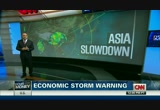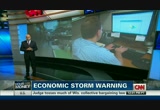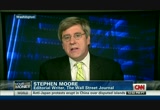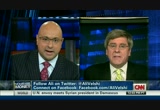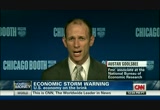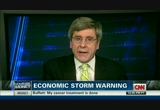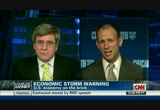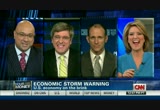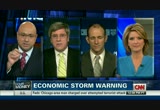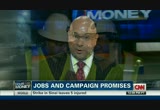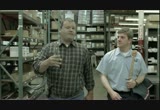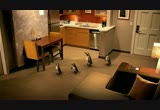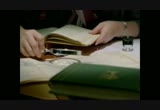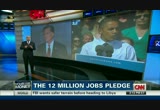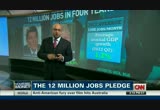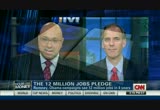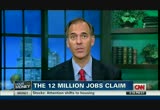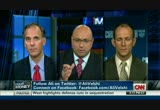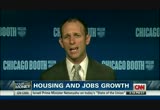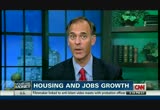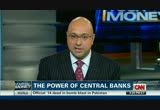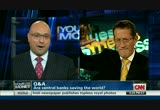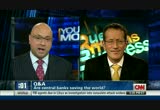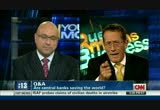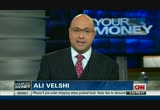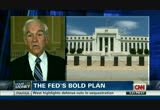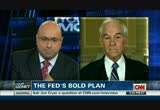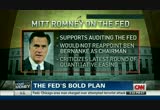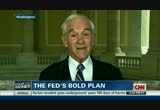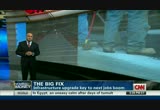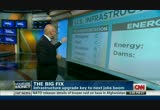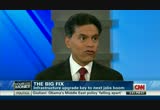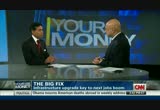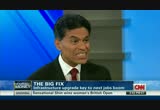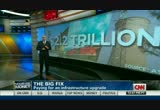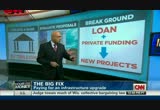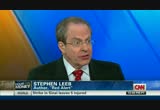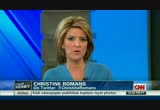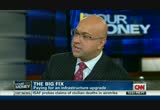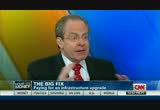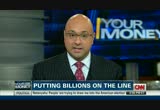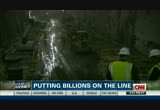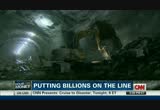tv Your Money CNN September 16, 2012 12:00pm-1:00pm PDT
12:00 pm
that economic storm i've been telling you about is still there, still approaching u.s. shores and still able to do a lot of damage to you. i'm ali velshi. this is your money, and as long as you won't be told the truth about the economy, i will tell you. they want to tell you 12 million jobs will magically appear if you put one of them in the white house. what i want is for them to level with you, because you could vote for someone that promises sunshine in america in the face of an approaching economic storm they may not be able to stop. the storm clouds are coming from europe, a continent still in recession that can't afford to buy american products and services. that storm has reached asia where factories that made exports for europe continue to
12:01 pm
shut down. it's slowing things down here in america. last month america lost 15,000 manufacturing jobs. there's only so much washington can do about that storm, but with some real work, they could help avert the storm that's being created in the nation's capit capitol. that second storm started a year ago when the president and congress made a deal with the devil. find a deal to cut the deficit or subject america to a scorched earth policy of reckless, across the board budget cuts. it's called sequestration, a stupid name for an equally stupid idea. a trillion dollars of mandatory spending cuts that may shed a million jobs when we need them most, and right now nothing is more important to our country than creating jobs. but there's more. a series of mandatory tax hikes that will hit us all, working class and wealthy alike, will all pay more after january 1st if congress doesn't act soon. but congress won't act now before the election because that would mean bipartisanship and
12:02 pm
compromise, two things that don't seem to get votes these days. even the chronically understated ben bernanke keeps warning congress it has to deal with unemployment. this week the good ship qe3, it's not a ship, but the third round of quantitative easing, yet another counter-intuitive phrase for the unwashed masses. so america, you could get pushed over that fiscal cliff that i think will wreak havoc on the economy. steven, you would rather cut off your toe than increase america's debt, so why should we be putting that off until after the storm? >> lacook, ali, i have to say i frustrated with this discussion because the fiscal storm you're talking about, the economic storm, you're right. it's here. i think a lot of americans think it never left from 2008.
12:03 pm
but look, at some point you have to pay the piper, and what frustrates me, ali, is when we discussed this three or four years ago, you were all in favor of the big $830 billion stimulus bill -- >> yep. >> -- and these other programs, and what you're essentially saying now, ali, is who ever thought this would happen? we have to pay the piper. this always happens, and it seems to me what you're saying is let's continue to borrow, let's continue to have what ben bernanke wants, which is easier money, and i don't think that works anymore. i do think we have to get serious about bringing this spending problem down. you don't tell somebody with a personal financial problem who has enormous debts, i'll just put it off for another year. it seems to me that's what your advice is to the congressman and the president. put it off for another year, let's keep borrowing, let's have another drink. >> you'll be interested to know i actually think the fed action disguises what they should do.
12:04 pm
it gives them a little cover. we agree on that. lights bring austin gillespie in. he's in the white house with president obama. you are part of the administration that's been accused of not using its full political capital to create jobs when it had the chance. how do you respond to that criticism? >> i don't think that's fair. that's coming at the president from the left, and you just heard steven saying he wished they hadn't done anything. i think though it may not have any implication for the election in 2012, historians are going to look back and avoiding the great depression in twa2009 is going be viewed as a huge accomplishment. the economic crisis in 2008 was bigger than the one in 1929 which led us to the first finan
12:05 pm
bigger share of the economy now than it was then. >> i'm so scared looking forward. we have to figure out in washington how we can fix the right now and look longer term to cutting our debts and deficits. why can't we do both? even more, why can't we do both at the same time? i'm not convinced that washington and party politics will allow us to do -- we have to be juggling a lot of balls. it can't just be debt reduction, and can't just be near term stimul stimulus. it has to be all of that and more. >> look, christine, i agree with you that it would be wonderful if we could do both. if we could stimulate the economy and then have these congressmen and senators turn into fiscal saints and cut the spending. i've been in this town for 30 years. >> i'm sorry. >> all i ever hear is put out the punchbowl and let's party. they never take the punchbowl away and that's the problem i
12:06 pm
have with what the three of you are saying. look, i think americans believe this debt is a real financial crisis, that this is not a fire drill, this is a really important component as to why the economy is doing so well. and austin, i'm not saying we shouldn't have done anything in 2008 and 2009. you're right, the president inherited a great economic crisis. the crisis we have now is here we are three and a half years later. the census bureau just came out with numbers this week that were a disaster. in connection with are still falling, the poverty rate is at a record high. the poverty ir ussues we put in place just didn't work out. >> we agree the poverty is a problem, so you should recognize in saying you're afraid of the fiscal cliff, steven, your contradicting your own point by saying, well, i'm really nervous that if they raise taxes and cut spending at a time like this, it's going to tank the economy. i think if you want to try to blame policy, then you have to
12:07 pm
explain why is it that in europe, in japan and in the rest of the advanced world where they're following different policies than what they followed in the u.s., they're actually growing slower than they are here? the u.s. is among the fastest growing of all the countries in the advanced world. ali, i think you're 100% right. this is a tidal wave that's sweeping the world economy as the tough struggle to get out of. i'm not advocating just 100% short run stimulus. in my view the main role of the government as the main driver of recovery should not be a permanent basis. that is absolutely not the sustainable way to do it. that was the thing you have to do when the private sector is in freefall, but at a time like this, we should be doing everything we can to encourage exports, investment and return to the private sector. going back to tax cuts makes it worse.
12:08 pm
>> and i was absolutely right, so christine, go ahead. >> ali didn't hear anything after you're absolutely right, ali. the issue here is we've got so many problems in the near term and we can't even agree on -- basically all they can agree on is running the government for the next six months, right? and there's also these mistakes that both parties have made and i don't see anybody owning up to their mistakes. early on, i don't think anybody really knew how deep the economic crisis was. and that's not a knock on the administration, because i don't think republicans knew how deep the economic crisis was, too. high marks in the early part of the crisis, but after that, it seemed to get a plan through just evaporated. now we're spending all this time looking backward. we'vlost this ability to look forward together. >> i believe it was last week where we both agreed you are not as obsessed with debt as some of
12:09 pm
your republican colleagues are. i'm using that word, it's absolutely a dangerous and misguided obsession. it's a serious problem. jobs should be where the obsession should be, creation of jobs. >> here's the point. first of all, austin, i agree with you. i think the tax agreement is a disaster. you put it right, we've got an investment program in this country, an export problem in this country. why would you want to raise it on investment? it's president obama who wants to raise the capital gains tax, the dividend tax. i'm against that. if i thought spending another trillion dollars in debt would get us out of this rut, i would agree with it. i think it's the wrong thing to do. i think spending in this economy is making the economy weaker. >> steven, good to see you, as always. austin, stay right where you are, christine, stay where you are. i've told you that the economy can create 40 million jobs in
12:10 pm
the next two years. i'll wear a dress for a week. later, it's some of the largest projects in u.s. history, the new york city subway, and you're footing the bill no matter where you live. i'll tell you why products like this could scrap the economy. there are a lot of warning lights and sounds vying for your attention. so we invented a warning you can feel. introducing the all-new cadillac xts. available with a patented safety alert seat. when there's danger you might not see, you're warned by a pulse in the seat. it's technology you won't find in a mercedes e-class. the all-new cadillac xts has arrived, and it's bringing the future forward. nothing complicated about a pair of 10 inch hose clamp pliers. you know what's complicated? shipping.
12:11 pm
shipping's complicated. not really. wi priority mail flat rate boxes from the postal service shipping's easy. if it fits, it ships anywhere in the country for a low flat rate. that's not complicated. no. come on. how about... a handshake. alright. priority mail flat rate boxes. starting at just $5.15. only from the postal service. wouldn't it be nice if there was an easier, less-expensive option than using a traditional lawyer? well, legalzoom came up with a better way. we took the best of the old and combined it with modern technology. together you get quality services on your terms, with total customer support. legalzoom documents have been accepted in all 50 states, and they're backed by a 100% satisfaction guarantee. so go to legalzoom.com today and see for yourself. it's law that just makes sense.
12:13 pm
the most important election issue this year is jobs, but you could end up basing your vote on a lie. it all started with the romney camp claiming that president romney would create 12 million jobs in his first four years as president. that's 3 million a year or an avr average of 250,000 jobs a month. i asked romney advisers how they came up with that number. they had big answers about economic growth and tax reform. instead of calling out the romney campaign for making
12:14 pm
claims which scanned evidence, the obama administration repeated it, calling it a low bar. if it's such a low bar, why didn't the obama campaign come out with it first? both sides have made a cynical calculation, telling you an optimistic view of the economy is more important than telling you the truth. 12 million jobs in four years has happened in america before, twice in the last 15 years. they added 12 million jobs beeen 1983 and 1987 when ronald reagan was president. the average growth in those four years was 9%. and with president clinton, the economy was growing at 4.3% each year. next year, if we're lucky and a storm doesn't hit and we don't go over a fiscal cliff and nothing else goes wrong with china or europe, maybe we'll hit 3%. that's optimistic. nowhere near where we were the last two times that america
12:15 pm
created 4 million jobs in three years or 250,000 jobs per month. the former chairman of the council of economic advisers and a professor at the university of chicago boots school of business. austin, you have a chance right now to call out the biggest lie in this campaign. please tell my viewers that they will not be seeing me in a dress, which is what i promised if 12 million jobs were created in four years. they won't see that, because this economy is not going to allow for 12 million jobs in the next four years. >> ali, i learned a long time ago not to make forecasts because i would look dumb. the private sector in even the last two years which has been, as you say, modest growth has added something like 4 million jobs over two years. so it would have to speed up but it wouldn't have to speed up to something unbelievable to do that. >> let's bring in a guy who has made the forecast, actually.
12:16 pm
moody's analytical chief analyst mark zandi written the book "paying the price" on a new job obsession which is optimistic that we'll create new jobs. i'm big on optimism, we don't see enough of it. the national budget office predicts the economy will create 9.6 million jobs in the next four years. that is higher than what we've seen in the last 12 years. you are on the side of this idea of 12 million jobs in the next four years regardless of who becomes president. and you make an interesting observation, that housing is going to drive it. >> i think you should start shopping for that dress, ali. i think it's very doable we hit 12 million. austin is right, over the past year we created -- and the year before that we created 2 million jobs in each of those years, and
12:17 pm
it's obviously in a very tough economy and it's in a period where government is laying off lots of workers, and that's not going to continue for four years. a year or two down the road, the government is going to stop laying off and start hiring again. so that will add a little bit of juice. the real kicker is the housing and construction cycle. as you know, coming out of the recession in the post world war ii period, it's the housing and construction that provides the real boost where a lot of the jobs come from. it's not happened this go-around because housing was ground zero for our problems, but housing has already started to kick in, and in two years, there will be a lot of construction jobs. transportation, distribution, landscaping, home depot lowe's, you can go on and on and on, and that's going to give you the added jobs to get you to that 12 million number. so it's very, very doable. >> austin, one of the things we looked at when we look at this silver lining around some of the economic clouds, we know markets
12:18 pm
are doing well and a particular housing sector we know is doing well, as mark said, but you can get a 30-year loan for 3.8% and home affordability is at the lowest it's been. people still don't have jobs. how is that going to solve this problem? >> well, look, if the mechanism that mark described kicks in, that we finally turn the corner and we kind of plow through these 5 million vacant homes that got overbuilt in a bubble, normally the job creation, as mark highlighted, is up to a third of the typical expansion coming out of a recession is coming from either construction or housing-related stuff. so i think you could start seeing some jobs from that, and look, you could start seeing the jobs coming from an increase in investment and increasing shift to exports. the fundamental problem of why it's taking so long to get out of this downturn i we can't go back to doing what we were doing right before the recession
12:19 pm
began. normally in the v shape recoveries, like 1983-'84, you go right back to doing what you did before. what we were doing before was overbuilding housing and consuming more than we were earning, and you can't go back to that. >> mark, you say, and clearly you've said this because you made this prediction, that this doesn't depend on who becomes president. >> right. right. it doesn't. i mean, the key working assumption, and you've been talking about it all morning, is that we're able to reasonably gracefully navigate through the fiscal issues we'll have to struggle with after the election. the fiscal cliff, the treasury debt ceiling, we'll have to come up with spending, tax revenue increases that allows us to get close to some kind of fiscal stability. my view is regardless of who wins the election, the policymakers are going to come together because it's in their interest and the economy's interest, and they're going to reasonably, gracefully address
12:20 pm
these issues. it's going to be tricky, and i'm not saying we'll create a lot of next in the next 12 months, but once we get past these issues, and i think we will this time next year, and particularly in 2014 to 2016, the economy will be in full swing. and the private sector, if you look at businesses, the american companies, if you look at american banks, if you look at american house holds. we still have issues with foreclosures, but outside of that, the private sector is in very good financial shape. the only missing ingredient is confidence, and we're going to get that confidence back if we nail down these fiscal issues, and i think we will. >> you boys are optimists. thank you both for being with us. if i do end up wearing that dress in four years, it will be very different than a shirt and tie. up next, are central banks saving the world or makesing things worse? we'll get ron paul's look at the
12:21 pm
12:22 pm
12:24 pm
this week the federal reserve announced quantitative easing, bond purchases every month meant to give banks the ability to lend more to people in the united states. italy and spain, two big countries considered too big to fail in the ongoing eurozone crisis could get bailout funds going forward to bring down their borrowing costs. both are instances of central banks initiating action when the political will to act is lacking, whether in washington or in europe's capital. joining me now to debate the tactics is rich quest. richard, welcome. today's q and a question is are central banks saving the world or are they making things worse? i'll go first, richard.
12:25 pm
give me 60 seconds on the clock starting now. richard, central banks are doing the right thing by taking action to shore up our troubled economies, but it is only half the equation. there is a world financial crisis like the one we witnessed four years ago when lehman brothers collapse two things need to be done. number one, central banks need to step in with emergency fiscal moves. two, make smart political decisions and that is what's lacking in the united states and in europe's capitals. america today is not in a crisis but it is facing this upcoming economic storm that you people are blowing our way by taking crisis style emergency action this week like the fed did. it showed that the real problem ailing america today is a complete lack of political will and leadership. in other words, the fed provided cover for washington's useless politicians. so can central bank save the world? yes, and this is a big but, they can't do it alone. you need the right plig decisions as well, and in
12:26 pm
washington, richard, our politicians have advocated their responsibility to uphold the public good. richard, your turn. >> well, one is never surprised with your views, and here we go. the core question, save or suffer? are the central banks doing what is necessary to prevent a bad situation becoming worse? and the answer is yes, and for one very simple reason. they are the only game in town. you're right, ali, up to a point. the u.s. congress has abrogated its responsibilities. in europe, the country's government, they know what they want to do, they just can't get reelected if they do it, and they can't agree. so in this scenario, it is only -- only -- only the central banks that can really make progress. but, and here's the difference between the fed and the ecb.
12:27 pm
what price do those central banks exact? in the ecb's case they've got economic reform, they get commitments, they make sure they only buy the bonds after they've got promises. as for the feds -- they're printing money without any promises or reforms to show for it. >> that was a minute and 15 seconds, but nonetheless you make a strong argument. you've heard from me, you've heard from richard, now you'll hear from this man. >> i would give the federal reserve a very, very low grade. i don't know if it's an f or f-minus, but it's very, very bad. >> congress won't help but congressman ron paul certainly isn't turning to the fed. i'm going to find out just who he believes can help america from the economic storm that could be headed our way.
12:28 pm
try zyrtec®. it gives you powerful allergy relief. and zyrtec® is different than claritin® because zyrtec® starts working at hour 1 on the first day you take it. claritin® doesn't start working until hour 3. [ sneezes ] [ male announcer ] zyrtec®. love the air. join zyrtec® rewards. save up to $7 on zyrtec® products. ♪ [ male announcer ] its lightweight construction makes it nimble... ♪ its road gripping performance makes it a cadillac. introducing the all-new cadillac xts. available with advanced haldex all-wheel drive. [ engine revving ] it's bringing the future forward.
12:29 pm
wouldn't it be nice if there was an easier, less-expensive option than using a traditional lawyer? well, legalzoom came up with a better way. we took the best of the old and combined it with modern technology. together you get quality services on your terms, with total customer support. legalzoom documents have been accepted in all 50 states, and they're backed by a 100% satisfaction guarantee. so go to legalzoom.com today and see for yourself. it's law that just makes sense.
12:31 pm
federal reserve's latest attempt to stimulate the economy, ask my next guest doesn't want the fed to save kmethe economy. in fact, he doesn't want the fed to exist at all. he calls the federal reserve system, quote, dishonest, immoral and unconstitutional. the federal reserve has two mandates of keeping prices stable and promoting employment. our number one issue is jobs. if lots of people are employed, a lot of these problems go away because you're not supporting people, people are paying taxes. your fellow congressmen aren't helping the situation and you don't trusted fed. so what's the fix? >> well, they haven't done their job, and they're supposed to have full employment or take care of unemployment, and they've done a lousy job, so i don't know why we can trust them to do something that quite frankly they're incapable of doing. they can't practice central economic planning through management of money in credit,
12:32 pm
and i think we're seeing the results. they can create a bubble, and they can -- you know, they can create times that look good, but they're artificial, they're distorted, there's now investment, and you do have inflation now that people don't admit to. you said i don't want the fed to fix the economy, i want to fix the economy, but we could fix the economy if we had not had the fed trying to manage the economy for a long time. so, yes, i believe in the market, and most people, you know, who are investors and believe in the free enterprise system believe in the markets, but not in money. money is half the economy. so you want price fixing in there with the money, that's the interest rate, and price fixing doesn't work anyplace else, so why would it work with money? >> for a second put aside what you would do with the fed question and go back to the fed was trying to fix things in the economy. you said they're not an effective tool but they're trying to increase employment.
12:33 pm
congress really isn't helping on that front. do you believe congress could have a bigger role in supporting a and growing employment in this country? >> absolutely. congress is always too involved. too much regulation, too much taxes, too much spending, but the spending wouldn't occur if you didn't have the fed. because the members of congress are politicians and they won't cut because they'll be afraid they'll lose the next election. but the fed is always ready to buy the debt. there is no incentive under these circumstances for a politician to spend less, so if they want to run the american empire around the world, no reason to back off for economic reasons. if you want the welfare to stay forever, no reason to back off until the collapse comes. so i'm trying to come back to a sane policy and try to prevent the collapse of a dollar. >> you refuse to fully endorse mitt romney. he says he wouldn't reappoint ben bernanke as fed chairman.
12:34 pm
he's criticized the latest round of fed stimulus qe3. is there something mitt romney could do to get your support? >> probably not at this stage, because i'm concerned as much about the foreign policy as domestic policy and monetary policy. i feel good that he and i have had discussions on the fed and he has made some statements, and he supports, you know, this position now about defense, so i would say that's very good. we had a lot of debates, we got along quite well, but we had a lot of disagreements on the policy of what the role of government ought to be. >> you don't like his foreign policy position. do you like obama's any better? >> not much. i don't like the foreign policy since woodrow wilson, because we have become, you know, this policing of the world, and we're broke, and we have an empire, and just look at what's happening in the middle east today. 11 embassies have been involved in anti-american demonstrations.
12:35 pm
the people around the world are sick and tired of us telling them what to do and cropping up dictators they don't like and prompting these demonstrations. so it's the woodrow wilson idea that we're going to make the world safe for democry, we're going to fight a war to end all wars, and just look what's happened. hundreds of millions of people have died, you know, not that that's our fault and our policy, but we have been trapped into believing that we have to be just like the economic planner, the fed at home overseas, it's a foreign policy that supports an empire that we cannot maintain. it's bad policy and we don't have any money. >> ron paul, it was a pleasure talking to you. thank you for joining us. >> thank you. coming up next, the economic storm is coming but there is a way out. we could prepare for this one and other economic storms that will inevitably come our way in the future. i'll show you how, next on "your money." nobel laureate in economics, and one of the most cited economists in the world.
12:36 pm
professor sargent, can you tell me what cd rates will be in two years? no. if he can't, no one can. that's why ally has a raise your rate cd. ally bank. your money needs an ally. imimagaginine e ifif y yod alalwawaysys s seeee l e [m[mususicic]] inin t thehe b besest t lil. eveverery y titimeme o of f. ououtdtdoooorsrs, , oro. trtranansisititiononss® ls auautotomamatiticacalllly y fift ththe e ririghght t amamouountn. soso y youou s seeee e eveg ththe e waway y itit is memeanant t toto b be e ses. mamaybybe e evevenen a lilittttlele b betette. exexpeperirienencece l lifife e, asask k fofor r trtrananss adadapaptitiveve l lene. oh, hey alex. just picking up some, brochures, posters copies of my acceptance speech. great! it's always good to have a backup plan, in case i get hit by a meteor. wow, your hair looks great. didn't realize they did photoshop here.
12:37 pm
hey, good call on those mugs. can't let 'em see what you're drinking. you know, i'm glad we're both running a nice, clean race. no need to get nasty. here's your "honk if you had an affair with taylor" yard sign. looks good. [ male announcer ] fedex office. now save 50% on banners. scroll... tap... pinch... and zoom... in your car. introducing the all-new cadillac xts with cue. ♪ don't worry. we haven't forgotten, you still like things to push. [ engine revs ] the all-new cadillac xts has arrived, and it's bringing the future forward.
12:39 pm
parts of america are crumbling. parts of america are sicmply no keeping up with the rest of the world. we need to upgrade our roads, our ports, our bridges, our railroads, our utilities, our broadband capabilities, all of it. it's how you attract and keep business. you spend the money now to give america the tools to grow for decades to come, and in the process you create jobs to build it and living wages that allow americans to thrive. now, this is a big idea. it sounds a lot like what many thought the stimulus of 2009 was supposed to be. at the same time, it reeks of deeper government involvement in the economy. that's why nobody is really talking about it. it also won't do anything about this economic storm that could hit in coming months. but it will be the best storm
12:40 pm
shelter money could buy for the future. a recent trip i took to china reminded me that there are parts of the world that are simply working better and smarter while america is struggling to keep up. in post-war america, fdr's new deal and the interstate highway system under eisenhower created millions of new jobs and great infrastructure, but boy, they cost a lot of money. since world war ii, there have been things in the u.s. economy that have been major drivers of growth and employment, growth that usually centers around manufacture and cheap credit and housing and technology, all of it made the middle class richer. infrastructure could be the next big driver of that kind of prosperity. now, the american society of civil engineers does a study every four years on everything from train lines to the electrical grid and drinking water. here's their breakdown on how america is doing. the type of infrastructure you
12:41 pm
probably think of first is transportation. rails gets a c, transit gets a d, roads get a d-minus. progress has been made over the past decade, but demand for energy is also rising quickly. it gets a d-plus. our dams, many of which also produce power, receive an even lower grade, a d. you take all those areas and a few more into account, that's what america gets. a d. it's not a failing grade but pretty poor. i want to bring in fareed za r zakar zakaria. he's the host of "fareed za car -- zakaria. what do we think the return of that type of investment could be? >> historically the return has been extraordinary. if you think about the erie canal, i think about the land grant colleges, you think about
12:42 pm
eisenhower's interstate highway system. california, after all, was built with the greatest highways, the greatest public parks, the greatest state universities, and that produced everything from silicon valley to hollywood. historically this has been a huge multiplier, so we should look upon it as laying the foundation, as you were saying, for the next generation of growth. >> part of the problem with the stimulus in 2009 is while it was supposed to lay the foundation for the next generation of growth, it was also supposed to provide immediate jobs. a lot of people said much of the stuff in there was too complicated, there was too much red tape or didn't create the jobs. is there a way to do this efficiently, to employ, let's say, a trillion dollars in a way that really builds the things we just talked about efficiently and yet creates jobs? >> there is. remember, the stimulus was one third tax cut, one third went to local governments to stop them from firing schoolteachers and firefighters, and a third of it went to stimulus. that piece actually worked pretty well. the best thing we could do would
12:43 pm
be to create a national infrastructure bank. then you take federal capital, state government money, and you provide capital. and we do it together. but something odd in the united states. we build infrastructure in that country in a more socialist fashion than any other part of the world. >> government builds it. >> government build it, they own it. in other countries, they will build highways, and think about the way airports work now. that's the only place we have a public private ownership. we lease out a lot of it to private operators. we say to them, you pay us something back, we make money, we both win. that's the best way to do it so the government doesn't have to put up that whole trillion dollars. they would probably only have to put up a tenth of it.
12:44 pm
with money so cheap now, you could borrow essentially at no interest rate. this is the time to do it, and this is also the time to do repairs. >> fareed, thank you for coming. good to see you, as always. >> a pleasure. i'm going to put a price tag on the suggestion that fareed just made. youratching "your money" on cnn. we took the best of the old and combined it with modern technology. together you get quality services on your terms, with total customer support. legalzoom documents have been accepted in all 50 states, and they're backed by a 100% satisfaction guarantee. so go to legalzoom.com today and see for yourself. it's law that just makes sense.
12:45 pm
12:46 pm
12:47 pm
take a look around you this weekend. bridges need repair, railroads need more tracks and our energy grid needs to be updated. this infrastructure gets a d from the american society of civil engineers. america has work to do, but you're asking what it's going to cost. well, the group estimates that we need to spend $2.2 trillion over five years to bring everything into "good" condition. that's their word. that includes projects already in the works, like president obama's american recovery and reinvestment act, which you know as the stimulus bill, but everything in place only accounts for about half of that
12:48 pm
2.2 trillion. so either the public or the private sector is going to need to come in and invest. one of the ways to do that is create an infrastructure bank. you heard fareed talk about it. it's an idea already in the minds of lawmakers. it's in the jobs bill that president obama proceed diced. here's how it would work. the government would create a bank. they would fund it. they put a trillion dollars in, least issay. that's a made-up money, but it would be taxpayer money. then cities or towns or private companies would submit proposals for projects. those proposals could be an energy grid, it could be arm airports, bridges, high speed rail, whatever you want. the bank would evaluate these projects and select certain ones based on the cost and investment they would get for that investment. then the bank would issue a loan guarantee or line of credit to help start the project.
12:49 pm
once the project is done, fees, taxes, tolls and other revenues would be used to pay the bank back. at the end of the day, everybody wins. the government gets paid back, states, cities and towns get the up grad upgrades they need, businesses make money building thigese projects and they put people to work as these projects need maintaining for the next amount of years. he wrote "how prosperity leads to a way of life." i just came back from china which really underscores the difference between shanghai or dallas. they have an infrastructure that works. putting aside that the chinese do things we would never be able to do here in the united states -- trains run on time, the building infrastructure is better, everything is better. is this the way to get things done?
12:50 pm
>> china has a couple advantages we don't have. first, they're starting from scratch and that sometimes wbca be a big advantage. it's easier to put up a smart grid from scratch than replace an old grid. but china old one. most importantly, china's prioritized things. if you think the biggest infrastructure project this country has had was world war ii. the pytrierties were crystal clear. we did and guess what? we also built the foundation for prosperity there after. if we can set the priorities right. now, from my point of view, energy would be number one. if we can set the priorities right, get the politicians aboard, this bank makes a lot of sense. >> two major differences though. china is a communist country. there's a bureau that decides what the national strategy is
12:51 pm
going to be. we have far more people involved and we have conflicting views, so that's number one. i don't think anybody's ready to trade a bridge. two, china has cash, american dollars them. we borrow from china, buy chinese goods, every one of those goes back to china. in this country, we have to borrow the money to put in the bank. >> back to china. i don't know you're going to be mad at me for citie ining china this. let me show you a poll or study released by the national league of cities. it says 48% of cities are still cutting jobs. 43% are still raising fees like tolls. 45% are cutting spending on public safety. bottom line is we are not prioritizing. whether the it's the war or
12:52 pm
china. things that make life better. things that make people want to have their businesses here. things that make businesses want to stay here. >>ecause stimulus has become a dirty word because of politician in washington. in part because they're worried about getting hit for borrowing money. but the issue is the same congress that brought you the fiscal cliff and now has to fix the fiscal cliff, we're asking them to figure out a way to invest in our country in the future. no way, they'd have to be reincarnated into a different group of people. >> but it was a time in this country, ali, where the top businessmen used to get together. they didn't conspire to do anything, but they did try to set priorities for the country. we can recreate that kind of environment again and maybe that should be the top priority that would lead to an infrastructure
12:53 pm
bank because private enterprise must be involved in this project and we've got to get them all together and say hey, guys, we have a massive problem in the united states of america, but if we roll up our sleeves like we did in the second world war, we can win. >> we're going to talk about this a lot over the coming weeks. maybe somebody will decide they're going to make infrastructure part of their campaign. coming up next, one of the nation's largest public works project. still paying for new york's latest and most expensive subway line to be built, but just what goes into building a subway? i went under ground to find out.
12:57 pm
$4.5 billion for the first mile and a half. the new york subway line, which would run nearly the length of manhattan would cost between 22 and $24 billion. what's behind the tab? i went ten stories beneath the surface to get to the bottom line. backhoe excavators that can cost $700,000 apiece. man lifts that sell for up to half a million bucks. see that high droydraulic drill? they can go for 800 grand a pob. new york city has them working full speed ahead on its second avenue subway line. subways are expensive. just to give you a sense of perspective, way back when, the first subway in manhattan was 21 miles and cost $35 million. this one, about a mile and a half for about $4.5 billion. that's more than a billion dollar as stop.
12:58 pm
that's just for ase one. we went digging ten stories below manhattan to find out what goes into the bottom line on a new subway line. >> a bargain. $800,000 a pop. >> the most massive piece of equipment, the tunnel booring machine. digging from street level, boring is is much more efficient and disrupts life aboveground much less. >> little over two stories tall. it can go on average about 50 feet a day. >> one of these costs $12 million and requires 20 people to operate it. at 50 feet a day, boring two mile and a half tunnels takes a long time. >> this is a linear project, you must do the tunnels before you do this. >> and highly specialized labor ors with the ones who do that.
12:59 pm
miners work alongside operating engineers. >> on average, we pay a guy about $1,000 a day. >> it's putting people to work in a tough economy. the metropolitian transit authority expects phase one of the subway, three and a half stops anda new tunnel and a fourth stop, to create 130 jobs with an economic impact of almost $18 billion over the nine years of construction. >> new yorkers keep asking why does it take so long. >> it is normal. >> it is normal. it is what it takes. >> all the while, americans are footing the bill. no matter where they live. >> second avenue, $1.3 billion comes from the federal government and the rest of 3.15 comes from new york. >> the portion from new york comes largely from new york state bonds and mta bonds. >> in 20
170 Views
Uploaded by TV Archive on

 Live Music Archive
Live Music Archive Librivox Free Audio
Librivox Free Audio Metropolitan Museum
Metropolitan Museum Cleveland Museum of Art
Cleveland Museum of Art Internet Arcade
Internet Arcade Console Living Room
Console Living Room Books to Borrow
Books to Borrow Open Library
Open Library TV News
TV News Understanding 9/11
Understanding 9/11
